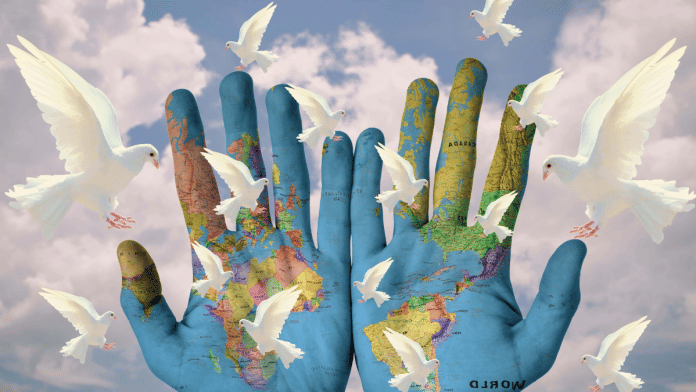Thank you dear subscribers, we are overwhelmed with your response.
Your Turn is a unique section from ThePrint featuring points of view from its subscribers. If you are a subscriber, have a point of view, please send it to us. If not, do subscribe here: https://theprint.in/subscribe/
Every October the world waits for the Nobel Peace Prize announcement, as if morality itself will be handed out in a velvet box. Yet year after year, we celebrate political figures who have presided over drone wars, invasions, and displacements—and call it “peace.”
But peace is not the hush that follows gunfire, nor the ink on a cease-fire accord. Peace is not negotiated in Oslo or brokered in Geneva. It is cultivated—patiently, privately—inside the human mind.
We have industrialised everything, even virtue. We manufacture peace conferences, televised compassion, and glossy human-rights reports. Still the world seethes with fear and resentment because we continue to confuse peace with pause, and calm with control.
The Forgotten Meaning
In the Indian civilisational view, śānti—peace—is not a treaty; it is a temperament.
Adi Shankara described it as “the fragrance of a mind free from delusion.”
It arises from viveka, the inner clarity that distinguishes the real from the unreal.
A person who cannot govern the storms within, he said, cannot build a society without conflict.
That principle built India’s cultural backbone. For centuries, restraint and inner balance—not conquest—were celebrated as strength. Yet modernity has turned the order upside down. Today we govern everything except ourselves. We have ministries of peace and happiness indices, but very few peaceful minds.
The World’s Misplaced Compass
Since 1901, the Nobel Committee has mostly rewarded those who manage conflict, not those who transcend it.
Henry Kissinger, Yasser Arafat, Barack Obama—the list is long and ironic. The world’s highest honour for peace rarely goes to those who are actually peaceful.
We treat peace as an outcome of politics rather than an outflow of consciousness. If it could be legislated, humanity would have achieved it long ago. The failure lies in vocabulary: we keep speaking of peace as something to be won, signed, or enforced. But genuine peace cannot be imposed; it must be radiated—from self to family, from community to nation.
The Quiet Firekeepers
Across the world, some institutions still understand this truth. The Chinmaya Mission, Ramakrishna Mission, and Arsha Vidya Gurukulam continue to teach that self-knowledge is national service. Their monks and teachers—Swami Tejomayananda, Swami Sarvapriyananda, Swami Tadatmananda—turn Vedanta into living practice, showing that calmness is civic strength. They all radiate their inner calm to those around them – help transform communities, societies and nations.
Beyond India, the Dalai Lama, Thich Nhat Hanh, and Eckhart Tolle have reminded the restless West that peace begins not with systems but with awareness—with the ability to pause, breathe, and see without judgement.
These are not movements of protest but revolutions of perception. They don’t demand followers; they create observers. Their work cannot be televised, yet its resonance is immeasurable.
The Economics of Stillness
Nations invest billions in defense but almost nothing in introspection. We measure prosperity in GDP, not in grace. Yet the most stable societies are not the richest, but those where citizens possess self-control, empathy, and reverence for life.
Peace is good economics. When the mind is unburdened by hatred and fear, creativity and cooperation flourish.
The GDP of serenity—if it were measurable—would reveal more about human progress than any fiscal graph.
A violent mind drains national energy; a tranquil one multiplies it.
The Redefinition We Need
We must reclaim peace from politicians and return it to people. A truly progressive nation should aim to produce calm citizens, not just armed forces. Schools should teach silence as a subject. Corporations should value empathy as a metric. Governments should view mental health not as therapy but as public infrastructure.
The 21st century will not collapse from lack of weapons, but from lack of stillness. If civilisation is to endure, it must rediscover the science of quietude—the courage to be unprovoked in a provoked world.
The real peace prize does not belong in Oslo; it belongs in every mind that remains still amidst noise and kind amidst confusion.
Only a still mind can hear the music of peace.
Mohan Murti, FICA
Advocate & International Industry Arbitrator
Former Managing Director-Europe
Reliance Industries Ltd. Germany
Member of the Supervisory Board,
Innoplexus AG, Germany
These pieces are being published as they have been received – they have not been edited/fact-checked by ThePrint.


